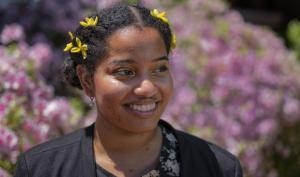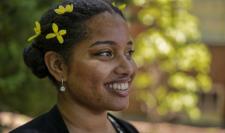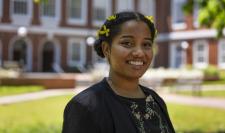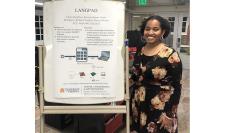Osman’s family eventually settled in Salisbury, on the Eastern Shore of Maryland. Osman’s mother became a math teacher, teaching Osman algebra in middle school, and her father, who studied agricultural engineering in Pakistan, became a lecturer of math and computer science. Osman attended James M. Bennett High School but also traveled down the road to Parkside High School for a pre-engineering program.
“Building with my hands in labs after school and seeing the robotics teams having fun gave me a good idea of what engineering was and what I could accomplish with it,” she said.
Osman came to UVA as a Jefferson Scholar with a strong interest in renewable energy and a desire to learn how sustainable, decentralized power systems could improve the lives of people like her extended family in Sudan.
She took part in the Engineering School’s Summer Bridge Program, a three-week opportunity for incoming first-year students from backgrounds traditionally underrepresented in engineering, such as Black and Hispanic students, to transition to Grounds. Hosted by UVA’s Center for Diversity in Engineering, Bridge not only helps students acclimate to the rigors of engineering courses but also gives them a head start on building networks of peers, faculty and staff.
“I met her on the first day of Bridge,” recalled Jason Jones, former director of the Center for Diversity in Engineering. “From day one, she really wanted to raise all boats with hers, and she just became a natural leader among her cohort.”
Osman credits Jones for her growth at UVA, too. “When I first came into UVA, I was overwhelmed,” Osman said. “I didn’t realize the importance of taking care of myself – self-care and my health and well-being fell to the bottom of my priorities as I struggled to adjust to the new environment. He just really cared about my well-being.”
Jones also connected her with internship opportunities while looking out for her career aspirations.
In the fall of 2020, Osman was selected to take part in UVA Engineering’s Policy Internship Program, which places students at government agencies, think tanks and non-profits. Osman was placed with the U.S. Agency for International Development, where she worked on two teams, the Strategy & Research Team and the Energy Team, both within the Bureau for Development, Democracy and Innovation. The internship aligned with her experiences as a young girl in Sudan.
“I worked on two projects. One was research on the root causes of blackouts in sub-Saharan Africa, and the other was a brief on digitizing renewable energy systems,” she said.
The research expanded her knowledge on issues around the maintenance and operation of transmission and distribution lines in developing contexts.
“That internship is what has really influenced my career decision. While I consider myself to be very humanities and service oriented, I received a lot of advice that gaining more technical experience will enable me to better contribute to this sector. So, my goal for the next year is to work as an engineer to gain those technical skills.”
After graduation, Osman will head to Georgia Power in Atlanta, Georgia. “It's an excellent opportunity to learn more about power systems as I work on the commissioning and maintenance of substations and transmission lines.”
She has her sights set on eventually tackling bigger power challenges.
“I know that superficial change will never be enough for her. She wants substantive change-real, positive change,” Jones said. “It gives me hope that these moonshot ideas around energy are going to actually come to fruition.”
Blake Jimenéz-Calhoun, UVA Engineering’s director of undergraduate success, started her job at the school at the same time Osman entered and has not only watched Osman grow as a person, but she’s seen how Osman has empowered her classmates. “I can say that she’s made a place for so many other students. She has been a pillar here.”
Osman is like kinetic energy – always in motion. Her service to others includes mentoring first-year students as a peer advisor for the UVA Office of African American Affairs, serving as executive director for the Muslim Institute for Leadership and Empowerment, and being a mentor for incoming Bridge participants, to name a few of her activities.
“It’s from my engagements in these realms that I continue to recognize the importance of diversity in engineering. Diversity leads to greater innovations and a better understanding of the people our technology will go on to affect,” Osman said.
It was no surprise that Osman and her team’s capstone project turned out to be very successful and focused on making life easier for others - in this case people who may be trying to type on computers in languages other than English. The group built a USB device that makes typing special characters in Latin-based languages, such as French and Spanish, easy and quick.
Those who know Osman best know that her point of view, her motivation, her selfless giving and her empathy, on top of her success in academics, will power her for a bright future.
“I look forward to a life of service where I will continue to support underserved communities for the improvement of our world,” she said.
“When I think about her career, it’s like buckle up, because I think she’s going to do phenomenal things, not just for her own professional career, but for every single person around her, and probably beyond,” Jones said.
“She’s just got this golden intuition about life and my hope for her future is that she continues to trust that and lean into it,” Calhoun added.
Any Power Ranger would.




